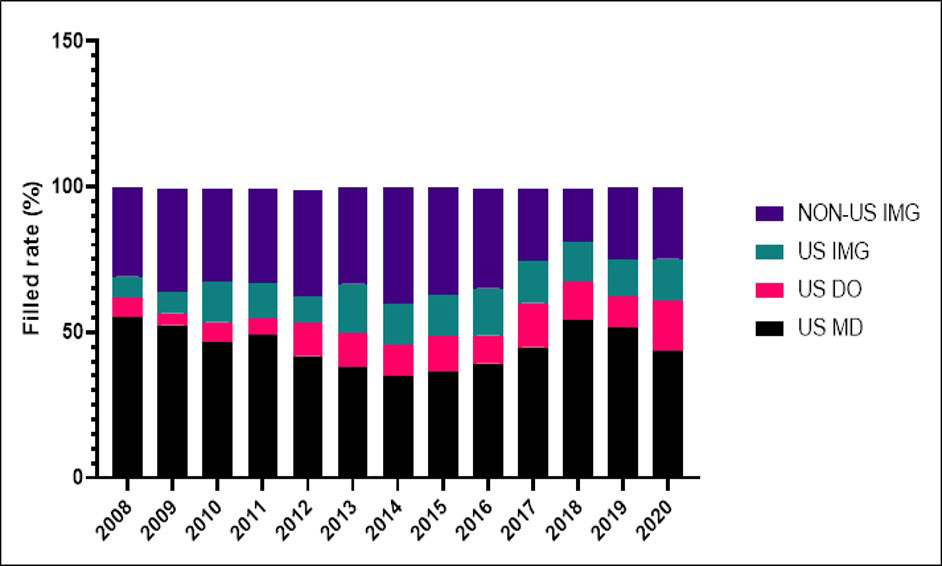Session Information
Session Type: Poster Session A
Session Time: 1:00PM-3:00PM
Background/Purpose: The goal of this study is to report the trends in the match results of International Medical Graduates (IMGs) from 2008-2020 into Rheumatology fellowship programs in the United States (US).
Methods: The reports from the National Resident Match Program (NRMP) data were accessed for years 2008-2020 through their website. Data specific to programs and information concerning rheumatology fellowship match were retrieved for US MD, osteopathic (DO) US IMG and non-US IMG applicants. Variables collected for each year included the number of positions, number of applicants in each group, positions filled/unfilled, and fill rate of each group. “Charting outcomes in the match” were used via NRMP website for gathering data on detailed analysis of applicant characteristics – such as United States Medical Licensing Examination (USMLE) Step 1 and 2 scores, number of research experiences, number of abstracts/publications, and additional degrees obtained. Simple linear regression analysis to determine significance in the trends over time was performed, p< 0.05 was considered significant.
Results: Rheumatology programs increased by 19.5% within the span of 12 years (p < 0.001), from 95 in 2008 to 118 programs in 2020, with an average annual increase of 1.8%. Number of rheumatology fellowship positions increased by 33.7% (p < 0.001), from 165 to 229, within this timespan, with the average annual increase of 3.34%. The fill rate has increased by 5%, resulting in 97.2% positions filled in 2020. Even though the percentage of US MDs has decreased from 55.3% to 43.4%, the total number of MDs has increased from 84 to 105 (p = 0.02). The proportion of US DOs has increased from 6.6% (10 in 2008) to 14.5% (42 in 2020) (p < 0.0001). Strikingly, the year 2020 saw a 14.3% annual decrease in MDs compared to a 40.5% annual increase in DOs, relative to year 2019. While the total percentage of all IMGs (US and non-US) among filled positions has remained the same, the proportion of US IMGs has doubled from 7.2% to 14.5% (p = 0.03), and the percentage of non-US IMGs has decreased from 30.9% to 24.8% (p = 0.038). [All trends summarized in Figure 1]. None of the applicants had additional degrees. The mean Step 1 and Step 2CK scores for US and non-US IMG’s increased during this period. Overall, non-US IMGs had slightly more research and volunteer experience than the US IMGs.
Conclusion: Rheumatology has been growing as a sub-specialty over the last 12 years, with an increase in yearly fill rate. Overall, the proportion of US DOs and US IMGs has increased over the years. Rheumatology is becoming a competitive specialty with increased average Step scores and number of experiences required for the applicants.
To cite this abstract in AMA style:
Ajayi T, Rasendrakumar A, Singh K, Skopelja-Gardner S, Khanna A. Whats Trending? A 12- year Analysis of International Medical Graduates Matching into Rheumatology Fellowship Programs in the United States [abstract]. Arthritis Rheumatol. 2022; 74 (suppl 9). https://acrabstracts.org/abstract/whats-trending-a-12-year-analysis-of-international-medical-graduates-matching-into-rheumatology-fellowship-programs-in-the-united-states/. Accessed .« Back to ACR Convergence 2022
ACR Meeting Abstracts - https://acrabstracts.org/abstract/whats-trending-a-12-year-analysis-of-international-medical-graduates-matching-into-rheumatology-fellowship-programs-in-the-united-states/

